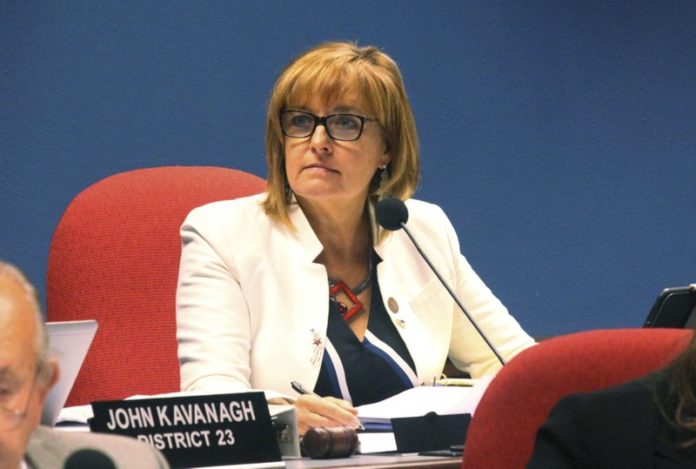
Republicans who control the Arizona Legislature on Monday amended a sweeping anti-abortion bill to satisfy concerns of a lone GOP senator who voted against the measure earlier this month and blocked it from advancing.
The move clears the way for the House and Senate to give final approval to the measure and send it to Republican Gov. Doug Ducey, an abortion opponent who has never vetoed a piece of anti-abortion legislation. Democrats universally oppose Senate Bill 1457.
The abortion bill, as originally written, made it a felony for a doctor to perform the procedure because the fetus has a genetic abnormality like Down syndrome and contained a slew of other provisions, including one opposition that confers all civil rights to unborn children. Democrats call that “personhood” provision a backdoor way to allow criminal charges against a woman who has an abortion.
A House Republican, Rep. Regina Cobb of Lake Havasu City, objected because the bill did not allow a woman to have an abortion if the fetus could not survive, so it was amended to allow that and sent back to the Senate.
That’s when GOP Sen. Tyler Pace of Mesa voted against it, saying he worried that language making it a felony for a doctor to perform an abortion for a lethal genetic abnormality could result in a jury having to decide whether the physician’s diagnosis was accurate.
The Senate last waived its own deadlines to allow the abortion bill to get a second vote once Pace’s concerns were addressed.
A new amendment tacked on in a conference committee Monday makes it a felony for a doctor to perform an abortion if the sole reason the woman seeks it is because the fetus has a genetic abnormality — providing a loophole for women who can simply say they want an elective abortion. And it clarifies the definition of a lethal fetal abnormality.
“At this point, I am comfortable that a physician can navigate these laws, that a jury would not be given the ability to play the medical board,” Pace said, saying that “a physician could navigate these without unknowingly causing themselves significant liability.”
Another part of the amendment clarified that in-vitro fertilization is exempted from the law. That was prompted by Democrats’ concerns that the bill’s “personhood” section would ban those procedures.
The measure is a top priority for the social conservative group Center for Arizona Policy, whose president, Cathi Herrod, routinely backs anti-abortion bills in the Legislature. Her group and others pressured Pace, who also opposes abortion, to accept changes.
Democrats say the bill infringes on a woman’s right to choose. In addition to the ban on abortions for genetic abnormalities and the “personhood” provision, the bill bans mail delivery of abortion-inducing medication, allows the father or maternal grandparents of a fetus aborted due to a genetic issue to sue, and bans the spending of any state money toward organizations that provide abortion care.
The measure also requires fetal remains to be buried or cremated, and it forbids state universities from providing abortion care. It also repeals an old law allowing women to be charged for seeking an abortion, needed in case the U.S. Supreme Court overturns Roe vs. Wade, the 1973 decision that found women have a constitutional right to seek an abortion.
At Monday’s committee hearing, Sen. Kirsten Engel, D-Tucson, said Pace’s amendment does not make it any less troubling to her that the Legislature is considering a bill that could send doctors to jail.
“I think the answer here is that this should not be criminalized at all and that we’re getting into territory that not a single person on this panel really has the expertise,” Engel said. “And that the entire bill is really taking away from a woman and her doctor the right to make these very, very critical decisions about reproduction.”
Last week, a divided federal appeals court lifted the hold on a similar Ohio law that prohibits doctors from performing abortions based on a fetal diagnosis of Down syndrome.
Judges of the 6th U.S. Circuit Court of Appeals narrowly reversed two earlier decisions blocking enforcement of Ohio’s 2017 law based on the likely success of overturning it as unconstitutional.
A majority of the court, which has moved rightward in recent years with six appointments by former President Donald Trump, said the law doesn’t impede a woman’s right to an abortion.
Monday’s amendment to the Arizona bill also added a legislative intent clause that included much of the reasoning the appeal court used in the Ohio decision.
Republican-controlled Legislatures in Arizona and several other states emboldened by the possibility that a more conservative Supreme Court could overturn Roe v. Wade have embraced proposals this year that could completely ban abortion. An Arizona proposal doing that, however, has not advanced.
Republished with the permission of the Associated Press.













